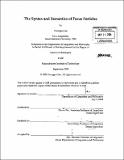The syntax and semantics of focus particles
Author(s)
Lee, Youngjoo, 1974-
DownloadFull printable version (11.29Mb)
Other Contributors
Massachusetts Institute of Technology. Dept. of Linguistics and Philosophy.
Advisor
Danny Fox and Irene Heim.
Terms of use
Metadata
Show full item recordAbstract
(cont.) (iii) covert operations such as reconstruction and type raising are constrained by an economy principle so that they are disallowed when not motivated. This dissertation investigates the syntax and semantics of two focus particles in Korean with special reference to their scopal behavior. The two particles under consideration are the exclusive particle man and the additive particle to. The main empirical concern of this work is to show that despite apparent syntactic similarities between focused phrases (i.e. phrases containing focus particles) and standard QPs, the former exhibits more diverse scopal behavior than the latter. The claims that are made in the course of the discussion of the scope patterns constitute the theoretical contribution of this work. The scope of the particle man 'only' varies with the morphological marking of the man-phrase, which is puzzling under the assumption that the particle is a scope-bearing element. I argue that despite appearances, the particle is not a scope-bearing element, but an agreement morpheme, and that the quantificational meaning comes from a null head ONLY. I also claim that the position of the ONLY head can be deduced from the order of nominal affixes, thanks to the strong correlation between morphology and syntax. This new correlation between nominal affixes and the scope of focus particles supports Baker's Mirror Principle in a new area outside the verbal domain. The scopal behavior of to-phrases is also distinct from that of QPs. Three factors are identified that affect the scope of to-phrases: scrambling, the kind of function in the preceding context, and the nature of the focused phrase. I claim that (i) the anaphoric view of additive particles is superior to the existential view, (ii) both syntactic and semantic mechanisms are available for variable binding, thus the presence of a bound variable in a dislocated position does not imply syntactic reconstruction, and
Description
Thesis (Ph. D.)--Massachusetts Institute of Technology, Dept. of Linguistics and Philosophy, 2004. Includes bibliographical references (p. 202-210).
Date issued
2004Department
Massachusetts Institute of Technology. Department of Linguistics and PhilosophyPublisher
Massachusetts Institute of Technology
Keywords
Linguistics and Philosophy.